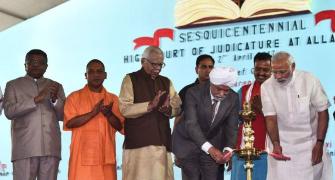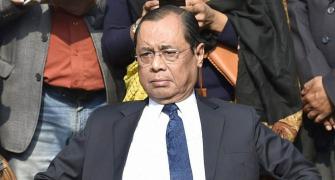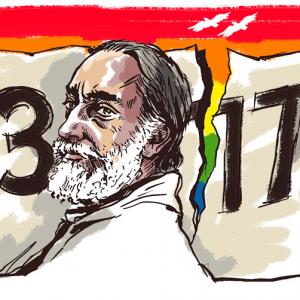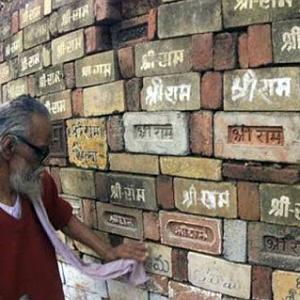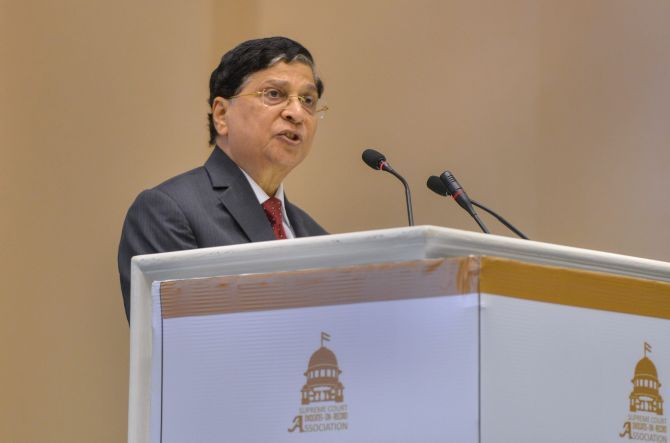
Chief Justice Of India Dipak Misra will retire on October 2 this year.
However, in the span of less than a month that he has in office, Justice Misra is expected to pronounce verdict on several crucial cases, which, if not disposed of by the incumbent CJI, will have to be heard afresh by a new bench.
Apart from high-profile cases like the validity of Aadhaar Act in light of the right to privacy judgment and Ayodhya land dispute, the CJI is also heading various benches that are expected to decide cases related reservations to Scheduled Castes and Scheduled Tribes in promotion in government jobs, the alleged dilution of Section 498A of the Indian Penal Code -- which stipulates punishment against harassment of women by husband and in-laws -- and framing of guidelines to check violence and vandalism by a protesting mob.
Here's a list of big cases that the incumbent CJI is likely to decide:
1) Ayodhya land dispute and whether offering namaz in mosques is an integral part of Islam
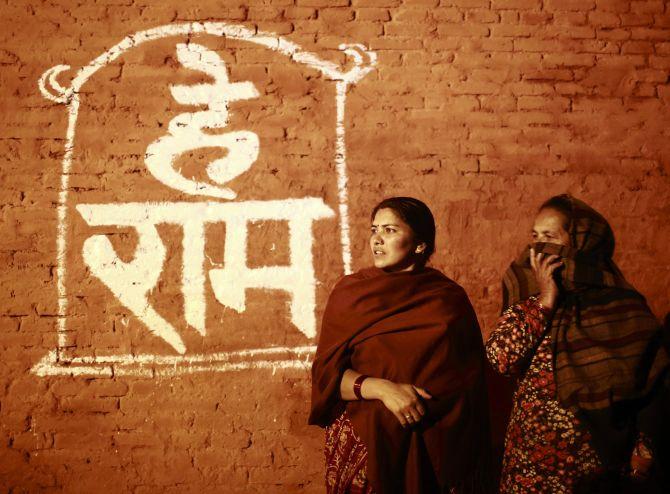
A three-judge bench headed by the CJI had reserved its order on whether to refer to a larger Constitutional Bench its 1994 order which said that 'offering namaz at mosques is not an integral part of Islam'.
This is part of the court's judgment on pleas against the 2010 verdict of the Allahabad high court that divided the disputed land into three parts.
However, a plea by Sunni Waqf Board sought the SC to reconsider its 1994 judgment as the Allahabad HC verdict was based on observations in that case.
All parties have so far maintained that the decision of the top court on the land dispute would be acceptable to them.
2) Validity of Aadhaar Act
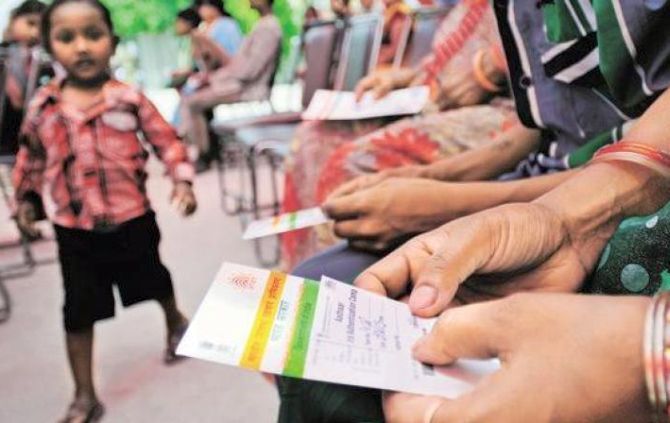
The verdict in this case also has been reserved by a five-judge bench headed by the CJI.
The original pleas were filed in 2015 challenging collection of biometrics by the Unique Identification Authority of India.
However, as the Adhaar Act was passed in Parliament, after being categorised as a Money Bill, fresh petitions were filed challenging the constitutionality of the Act and its passage as a Money Bill.
The verdict of nine-judge Constitutional Bench declaring privacy a Fundamental Right will certainly have a bearing on this case.
- ALSO READ: Aadhaar-Boon or Bane
3) Entry of women in Sabarimala Temple

Interestingly, the lawyer representing People for Dharma and NGO Chetna in this case relied on the right to privacy judgment to argue that allowing women inside the temple of the 'eternal celibate' deity would be a violation of his right to privacy.
The lawyer said that Lord Ayyappa of the Sabarimala is a 'juristic person' for the purposes of property ownership and taxes and hence, he equally has rights under Article 21 (protection of life and personal liberty), 25 (freedom to practice religion) and 26 (freedom to manage religious affair) of the Constitution.
Though the SC termed the arguments 'impressive', it maintained that women have a Constitutional right to enter the temple.
The case an interesting conflict between the right to religious practise under Article 25 or prohibition of gender-based discrimination under Articles 14 and 15.
The verdict was reserved on August 1.
4) Punishment for adultery

Responding to the case against Section 497 of the IPC, which punishes a man for having extra-martial sexual ties with the wife of another man, the Centre had said that scrapping the section would 'destroy the sanctity of marriage'.
The SC, however, disagreed with the Centre, saying that though matrimonial sanctity is an issue, the penal provision on adultery is apparently violative of the right to equality under the Constitution as it treats married men and married women differently.
Section 497 of the IPC says: 'Whoever has sexual intercourse with a person who is and whom he knows or has reason to believe to be the wife of another man, without the consent or connivance of that man, such sexual intercourse not amounting to the offence of rape, is guilty of the offence of adultery.'
The bench termed this aspect of Section 497 'manifestly arbitrary' and said it treated married women as 'chattel' on the ground that their relationship with other married persons depends on the 'consent or connivance of her husband'.
However, the Centre's affidavit sought the dismissal of the plea challenging, saying that Section 497 'supports, safeguards and protects the institution of marriage'.
The verdict was reserved on August 8.
5) Decriminalisation of homosexuality
It is another case in which the right to privacy verdict will play a crucial role.
The SC had reinstated Section 377 of the IPC, which punishes homosexuality, in 2013, reversing the Delhi high court order which struck down the section in 2009.
During the hearing, the SC said the right to sexual orientation is not a fundamental right but indicated that the right to choose a sexual partner is a fundamental right.
Hence, it is widely expected that the SC may strike down the section in its judgment that was reserved on July 17.
Other important cases in which judgments have been reserved by benches headed by the CJI involve disqualification of charge-sheeted politicians from contesting elections, live-streaming of proceedings of the apex court and plea seeking to restrict elected legislators from practising law.

